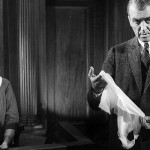Blow Out Review
While Blow Out feels like a typical thriller, it earns big points for doing some truly unexpected things. I’m not talking about reinventing a genre or anything, but compared to most paranoia, “me-against-the-world” thrillers, this one is full of genuine suspense, right down to its darkly ironic final moments. It’s easy enough to write off a forgotten Brian De Palma film from 1981, but thankfully, Criterion has given the film its due. It deserves to be seen and should be discussed in the same context as films like Three Days of the Condor and The Conversation. Like any De Palma effort, it’s pretty heavy-handed and goes through a few narrative rough patches, but on the whole, this is an engaging thriller, a playful exercise in sound design, and a damn fine film.
Jack Terry (John Travolta) is the sound guy on some really low-quality T&A flicks. One evening, his boss commissions him to go out and re-record some sounds of nature, but while in the woods, he witnesses an accident. A car careens off the road and into the river. Jack dives in and rescues a young woman, but at least one man perishes. At the hospital, Jack finds out that man was the governor and a potential presidential front-runner. The governor’s men tell Jack that the governor was fooling around with the young lady he rescued and that he must keep quiet or else destroy the dead man’s legacy. Jack reluctantly agrees, but when he listens to the tape of the evening, the sound expert hears something frightening—a gun shot, not a blow out as was reported. So he starts to investigate and begins with the one person who might know something about the incident—Sally (Nancy Allen), the woman he rescued and the governor’s mistress.
Films about the filmmaking process are always fun because certain technical elements usually go into overdrive. Here, it’s the sound. Much of the film’s sound comes from Jack’s process of designing sound for his movie. It’s a very clever premise that works magnificently with the type of film De Palma is trying to make.
As a thriller, De Palma does just about everything right. The stakes are appropriately high, and the twists are unpredictable. But what really sells the film is its ending. I’ve bitched and moaned more times than I can remember about films ending poorly. Blow Out, however, gets it just right.
Performances aren’t exactly the film’s strong point. John Travolta doesn’t really stand out. He doesn’t bring anything unique or really interesting to the role. He’s not bad, just unexciting. Nancy Allen is bad. It’s terrible watching actors or actress play high, and while Sally is in the hospital, she has to do just that. And it’s not pretty. The crazy thing is that even after she’s released from the hospital, she doesn’t really ever become more than a goofy ditz. She’s unbelievably irritating, and as a result, the emotional hook of her and Jack’s relationship fails to resonate.
My only other issues with the film related to De Palma’s direction. For the most part, his participation was a positive. But like most of his other films, he gets a little over-the-top. The film, at times, felt too campy, too clunky and in-your-face. Take the characters played by Dennis Franz and John Lithgow. Both are one-dimensional and contribute to the film’s B-movie feel. But Blow Out is so much more polished than that. Though their inclusion was necessary to the overall trajectory of the story, I wish De Palma had insisted they tone things down. Of course, “toned-down” isn’t exactly his style.
Those complaints aside, the film is great. Today, thrillers are mostly all action-oriented or horror, and you don’t get these devilishly clever paranoid flicks so common during the Cold War, but that’s precisely what Blow Out is. It builds itself up to a big conclusion and it definitely doesn’t disappoint in its final moments—so rare for most movies of any genre. So do yourself a favor and check it out.
















